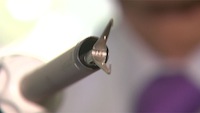
What Is a Laparoscopic Power Morcellator?
In laparoscopic surgery, small incisions are made in the patient to facilitate the insertion of tools used to carry out the surgery. A laparoscopic power morcellator is a device used to cut tissue into smaller pieces so that those pieces can be removed through the smaller incisions made at the start of the surgery.
What are the Risks of Using a Laparoscopic Power Morcellator?
 Current data shows that approximately 1 in 350 women having surgery to remove fibroids has an unsuspected uterine sarcoma–uterine cancer that caused no symptoms and has gone undetected. When the morcellator cuts this tissue, it can spread the cancerous cells to the abdomen and pelvis. This takes a cancer that was once isolated and contained and effectively aids its spread to surrounding areas. Once that happens, the patient’s prognosis for recovery and survival can be drastically reduced.
Current data shows that approximately 1 in 350 women having surgery to remove fibroids has an unsuspected uterine sarcoma–uterine cancer that caused no symptoms and has gone undetected. When the morcellator cuts this tissue, it can spread the cancerous cells to the abdomen and pelvis. This takes a cancer that was once isolated and contained and effectively aids its spread to surrounding areas. Once that happens, the patient’s prognosis for recovery and survival can be drastically reduced.
It is for these reasons that the FDA now recommends against using laparoscopic power morcellators in cases involving hysterectomy or myomectomy of uterine fibroids.
The problem may be larger than originally thought. A mother of 6 and an anesthesiologist in Boston who suffers from stage 4 leiomyosarcoma conducted a review of medical documentation and studies which originally estimated the risk of spreading cancer with a power morcellator at 1 in 10,000. The review team now estimates the risk at between 1 in 400 and 1 in 1000.
What Can I Do If Diagnosed with Uterine Cancer after surgery using Power Morcellation?
 Initial evidence suggests that the manufacturers downplayed this significant hazard for fear that it would cut into profits. If this proves to be true, manufacturers could be held liable for the injuries and deaths that were caused through a power morcellator lawsuit.
Initial evidence suggests that the manufacturers downplayed this significant hazard for fear that it would cut into profits. If this proves to be true, manufacturers could be held liable for the injuries and deaths that were caused through a power morcellator lawsuit.
If you’ve had a hysterectomy or surgery to remove uterine fibroids and were later diagnosed with cancer of the abdomen, pelvis, or have been diagnosed with metastatic leiomyosarcoma, you should contact a qualified attorney immediately to make them aware of your situation. An attorney will be able to investigate type of device used in your surgery, and determine if that device played a role in the spread of your cancer.
Lopez McHugh product liability attorneys have a long history of going up against product manufacturers and holding them accountable for the harm their products inflict on the public. Contact us here via our website using the form to the right or call (877) 737-8525.
